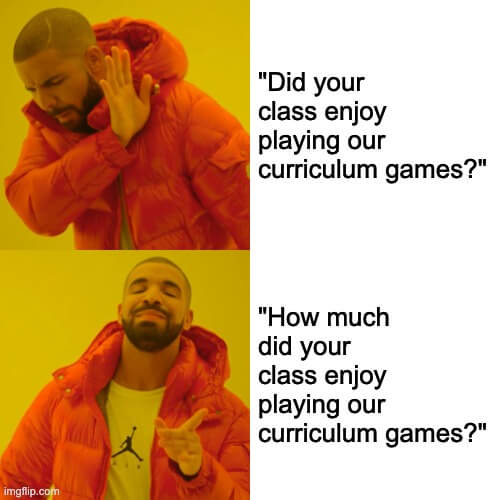Everyone wants people to say nice things about them.
But no one ever learned anything from a compliment.
Social proof (when people take cues from people around them – reviews, recommendations, testimonials etc) are one of the key ingredients of successful promotions.
While getting a super star celebrity to give your product the thumbs up may sound great, what teachers will want to know is what other teachers like them think about your product or service.
So your framework for getting powerful feedback, glowing quotes, and insightful opinion is worth spending time to get right.
Because it might help convince that headteacher to invest in you rather than your competition.
Match the questions to your benefits
You want your teacher testimonials to be aligned with your product benefits, value proposition, and target audience.
Because when you share their responses on your website or promotional material you want their words to match your purpose.
So be super specific with your questions.
Consider 3 pain points your service answers and set out 3 questions that fit how you solve that problem e.g. if your services saves teachers time, then ask how your service fixed that problem for them.
Is it OK to ask a leading question?
It’s totally cool to ask leading questions.


Only ask the questions you want answers to and make sure they’re framed to get a response that suits your objective.

Should we pay for a good teacher testimonial?
Pay? No.
Provide unique or time bound free access to your product or service in exchange for insights? Sure!
Testimonials are short-form recommendations from customers who gained value from your service.
Indeed, most teachers will happily give you feedback for nothing if asked.
But if you have freely provided something of value to a school or teacher (like an extended free trial, or free CPD) it’s fine to ask for something a little more substantial like a case study, video testimonial, or in-depth feedback.
As long as you are up front about about the mutually advantageous relationship and clear about expectations there’s no harm in pursuing this strategy.
Show the future state
Education marketing is often about showing outcomes so a great question to ask is about how they see your service impacting pupils/teachers/practice etc in a years time.
What do they hope to achieve with your service/product?
Why did they choose you over someone else?
Is the school seeking to address a specific need over time such as raising writing standards in Y6, reducing absence across a Key Stage, or transition safeguarding record keeping from paper to digital by the end of the academic year?
Teachers need to see the vision over time. It’s rare that a school isn’t planning investment 1-3 years in advance.
Therefore try to gain teacher testimonials that speak to that journey over time, and the positive effect it’s had on outcomes.
Use video to add authenticity
Mix up your testimonial media.
Text, quotation call outs, and photographs of students using your product are all fantastic social proof.
However you can’t beat a video.
On the whole try to avoid the sterile corporate style video. You know the kind of thing – straight to camera interview with a headteacher overdubbed with a pleasant ukelele soundtrack.
It’s been done to death.
For that reason, interview your customers with tools like Zoom or Zencaster.
You’ll get an embeddable object that works great on mobile, Facebook, Instagram etc and makes the testimonial 10x more compelling.
Don’t forget to add subtitles!
Think about your own Facebook feed – videos are silent by default, right? Apparently as much as 85 percent of video views happen with the sound off.
Let their answers breathe.
Additionally don’t “chit chat” with your interviewee during their responses so you can more easily edit between questions and answers later on. Leave a comfortable silence between your questions and their answer.
I can testify to the hours lost trying to edit out my ‘Sures’, and ‘Yeahs’, and ‘Ums’.
As an illustration of an authentic, cost effective video testimonial take a look at this video from Moki, who sell activity tracking bands to schools.
Get the recommendation
MOST IMPORTANT!
Above all, ask if they would recommend you to another school and why.
Referrals drive sales. A single, motivated teacher who recommends your brand/product/service can keep you in orders for years to come.
So have that conversation, record their referral, and plant the seed for future business.
Look outside
Social proof isn’t just what you create through surveys, interviews, and phone research.
Sometimes the most authentic testimonials come serendipitously and outside your organisation.
Set up keyword alerts on Google and Twitter for your brand. If you spot a blog post review of your product ask if you can link to the article, and embed positive tweets in your website and blog posts.
Get your product onto independent review sites like:
You will get good and bad feedback but, as I noted at the start, no one ever learned anything from a compliment.
Want exclusive education marketing advice?
TAIT, our marketing to schools newsletter, hits the inboxes of our industry’s smartest education marketing professionals every other Wednesday.












